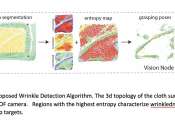In mathematics, computing, linguistics, and related subjects, an algorithm is a finite sequence of instructions, an explicit, step-by-step procedure for solving a problem, often used for calculation and data processing. It is formally a type of effective method in which a list of well-defined instructions for completing a task, will when given an initial state, proceed through a well-defined series of successive states, eventually terminating in an end-state. The transition from one state to the next is not necessarily deterministic; some algorithms, known as probabilistic algorithms, incorporate randomness.
A partial formalization of the concept began with attempts to solve the Entscheidungsproblem (the "decision problem") posed by David Hilbert in 1928. Subsequent formalizations were framed as attempts to define "effective calculability" (Kleene 1943:274) or "effective method" (Rosser 1939:225); those formalizations included the Gödel-Herbrand-Kleene recursive functions of 1930, 1934 and 1935, Alonzo Church's lambda calculus of 1936, Emil Post's "Formulation 1" of 1936, and Alan Turing's Turing machines of 1936–7 and 1939.









